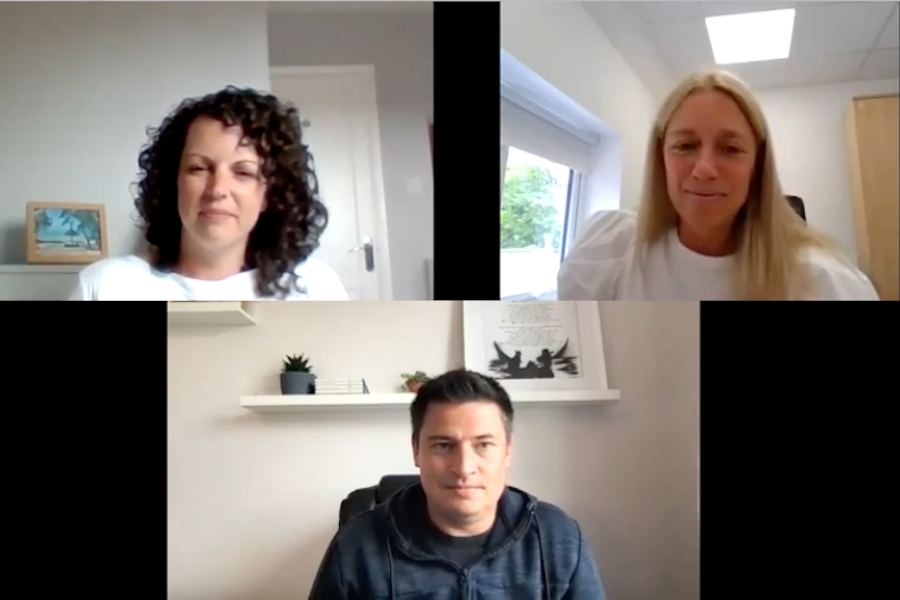Enquiries for live events have increased steadily over the past month thanks to a stream of positive announcements from the government over the changing or easing of Covid, travel and isolation restrictions, according to agencies speaking at our micebook talks event last week.
The panel, which featured Kirsty Northage, Account Director at First Event, Kate Anstis, Co-Founder, Freshly Squeezed Events and Shore Events MD Christopher Lind, were incredibly positive as they reported a “surge” in event enquiries and actual bookings.
Lind, who recently delivered an incentive in Mexico for a US client, said that Shore Events has seen an increase in domestic business. “We didn’t used to organise a lot of UK events, but we do now. People that used to travel elsewhere are now staying in the UK. We have a group in Scotland in September, and we have a couple of Christmas events that are already confirmed for December.
“We are putting some great proposals forward for the UK. I think clients are seeing it as a viable option now as it removes some of the risk. There are still people that want to travel abroad, but for those that are wary, travelling in the UK feels a bit safer.”
International increase
Anstis said that most of the agency’s recent wins have been for international briefs. “We are finding most of our briefs are for international travel. The events we have won are for Miami, Bahamas, Dubai, South Africa, and a couple in the UK.
“In terms of the briefs coming in, we have seen the Caribbean, a road show across Europe, skiing, Dubai and Ibiza – so quite a mix really. These are all brand new enquiries, not postponements. In terms of destination choice, there is a theme, they are all the countries we anticipate or perceive will be safe to travel to. The Caribbean in particular is quite popular, but there is not much interest in travelling east at the moment.”
She said that the government’s ‘Freedom Day’ announcement hadn’t specifically made a difference to enquiries, but that enquiries had been increasing steadily over the past month. “We are genuinely seeing more enquiries and people are signing contracts for live events. I think that is only going to increase after the 19 July. I think that the last few announcements as a collective have helped client confidence to grow.”
Northage said First Event had also seen a “massive increase” in enquiries over the past couple of months. “We are busy in September and towards the end of the year, but that is mainly UK based. It is being driven by a lot of clients that want to reconnect with and reward staff and customers after meeting virtually for so long.
“There are more overseas enquiries for next year, but we are also getting briefs from new clients for some big company-wide events. Some of them haven’t held events like that before but after what we have been through over the last year, they want to bring everyone together and celebrate getting through the tough times as a business.”
Key challenges
Other trends and challenges discussed included lead times being shorter than ever for both live and virtual events, venue availability issues, which is partly being driven by strong leisure demand, and slow response rates to briefs from some suppliers, particularly airlines due to furlough and staff shortages.
“It’s taking a lot longer than it did to get responses back. We are also finding the size of aircraft have been reduced on some major routes, or that the have reduced the number of flights so we can’t get the capacity we need for incentives. We have had to charter a plane for one incentive next year,” said Northage.
All three agencies are still delivering lots of virtual events, though Anstis said that demand had dropped off for virtual. There is still a lot of contingency planning in place for events, with scenarios for switching to virtual if infection rates continue to rise, or restrictions are put back in place.
However, on a positive note, clients are understanding that they are booking in a pandemic now and more accepting that terms have changed. “They are building in and accepting that there may be a small financial loss, whereas this time last year, everybody wanted every penny back from everything,” explained Anstis.
Another challenge, once all restrictions are lifted, will be putting in enough safety measures to make those who are still wary feel comfortable, while not impacting on the experience. “Once rules are lifted, I don’t think we want to stifle people socialising as normal,” said Anstis. “I hope we get back to a situation where people aren’t scared anymore and are comfortable being with people again.”
Lind thinks the change in isolation rules will have a big impact: “Many people are not risk averse about going to an event, whether that’s the football or a conference, but they are worried about getting the message from track and trace that they have been close to someone and have to isolate for 10 days as a result. The fear of getting covid is subsiding but it’s the impact of isolation that puts people off.”

